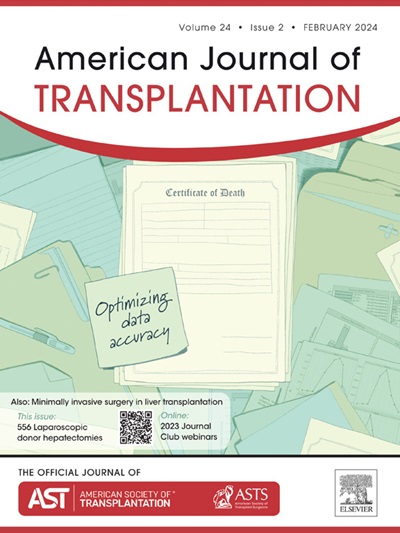Pancreas Irradiation for Treatment-Resistant Acute Cellular Rejection in a Severely Immunocompromised Pancreas after Kidney Transplant Recipient - Case Report.
IF 8.9
2区 医学
Q1 SURGERY
引用次数: 0
Abstract
Treating acute rejection of a pancreas transplant in a severely immunocompromised patient with viral opportunistic infection is challenging due to the balance of rescuing from rejection without worsening the morbidity of infection and prolonging the infection episode. We present a case involving a pancreas-after-kidney transplant in a patient with CMV high-risk discordance (donor positive/recipient negative) and chronic lymphopenia who developed difficult-to-treat CMV disease approximately six months after pancreas transplant. Following the withdrawal of the antimetabolite due to the persistent CMV DNAemia and lymphopenia, the patient experienced acute pancreas rejection without adequate and sustained response to treatment with steroids and Thymoglobulin. Moreover, systemic treatment for rejection resulted in higher CMV replication. Pancreas transplant irradiation was performed 5 months after initial pancreatic enzymes increase, resulting in a decrease of lipase below the normal range for 4-6 months thereafter. While pancreatic beta cells function appeared to be preserved based on stimulated C peptide testing, the patient suffered ongoing CMV DNAemia despite the treatment and eventually presented with hyperglycemia and DKA requiring insulin initiation. Pancreas allograft irradiation may be an option for the treatment of acute pancreas rejection. Appropriate timing to implement this modality and long-term endocrine outcomes need to be prospectively studied.胰腺照射治疗肾移植后严重免疫功能低下胰腺的耐治疗性急性细胞排斥反应-病例报告。
治疗严重免疫功能低下患者合并病毒性机会性感染的胰腺移植急性排斥反应是具有挑战性的,因为要在不加重感染发病率和延长感染发作时间的情况下挽救排斥反应。我们报告了一例肾移植后胰腺移植的病例,患者伴有巨细胞病毒高危不一致(供体阳性/受体阴性)和慢性淋巴细胞减少症,在胰腺移植后大约6个月发生了难以治疗的巨细胞病毒疾病。由于持续的巨细胞病毒dna血症和淋巴细胞减少而停用抗代谢物后,患者经历了急性胰腺排斥反应,对类固醇和胸腺球蛋白治疗没有足够和持续的反应。此外,排异反应的系统治疗导致更高的CMV复制。胰腺移植照射在初始胰酶升高5个月后进行,导致脂肪酶在此后4-6个月降至正常范围以下。虽然胰岛β细胞的功能根据刺激的C肽测试似乎得到了保留,但尽管接受了治疗,患者仍然出现了CMV dna血症,最终出现了高血糖和需要胰岛素启动的DKA。胰腺异体移植放射治疗可能是治疗急性胰腺排斥反应的一种选择。实施这种方式的适当时机和长期内分泌结果需要前瞻性研究。
本文章由计算机程序翻译,如有差异,请以英文原文为准。
求助全文
约1分钟内获得全文
求助全文
来源期刊
CiteScore
18.70
自引率
4.50%
发文量
346
审稿时长
26 days
期刊介绍:
The American Journal of Transplantation is a leading journal in the field of transplantation. It serves as a forum for debate and reassessment, an agent of change, and a major platform for promoting understanding, improving results, and advancing science. Published monthly, it provides an essential resource for researchers and clinicians worldwide.
The journal publishes original articles, case reports, invited reviews, letters to the editor, critical reviews, news features, consensus documents, and guidelines over 12 issues a year. It covers all major subject areas in transplantation, including thoracic (heart, lung), abdominal (kidney, liver, pancreas, islets), tissue and stem cell transplantation, organ and tissue donation and preservation, tissue injury, repair, inflammation, and aging, histocompatibility, drugs and pharmacology, graft survival, and prevention of graft dysfunction and failure. It also explores ethical and social issues in the field.

 求助内容:
求助内容: 应助结果提醒方式:
应助结果提醒方式:


